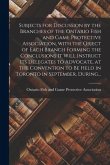The book charts the establishment of the modern idea of parliamentary sovereignty.
Concerned in a general way with theories of legitimacy, this book describes a transformation in English political thought between the opening of the civil war in 1642 and the Bill of Rights in 1689. When it was complete, the political nation as a whole had accepted the modern idea of parliamentary or legal sovereignty. The authors argue that a conservative theory of order, which assigned the king a lofty and unrivalled position, gave way in these years to a more radical community-centered view of government by which the king shared law-making on equal terms with the House of Lords and the House of Commons. Although the community-centered ideology may appear unexceptional to the modern observer, it constituted a revolutionary departure from the prevailing order theory of kingship and political society that had characterized political thought in the sixteenth and early seventeenth centuries.
Table of content:
Preface; 1. The shift in political thought; 2. The keeper of the kingdom; 3. The new age of political definition; 4. That 'Poisonous Tenet' of co-ordination; 5. The curious case of William Prynne; 6. The idiom of restoration politics; 7. Co-ordination and coevality in exclusion literature; 8. The law-makers and the dispensing power; Appendix; Notes; Bibliography; Index.
Hinweis: Dieser Artikel kann nur an eine deutsche Lieferadresse ausgeliefert werden.
Concerned in a general way with theories of legitimacy, this book describes a transformation in English political thought between the opening of the civil war in 1642 and the Bill of Rights in 1689. When it was complete, the political nation as a whole had accepted the modern idea of parliamentary or legal sovereignty. The authors argue that a conservative theory of order, which assigned the king a lofty and unrivalled position, gave way in these years to a more radical community-centered view of government by which the king shared law-making on equal terms with the House of Lords and the House of Commons. Although the community-centered ideology may appear unexceptional to the modern observer, it constituted a revolutionary departure from the prevailing order theory of kingship and political society that had characterized political thought in the sixteenth and early seventeenth centuries.
Table of content:
Preface; 1. The shift in political thought; 2. The keeper of the kingdom; 3. The new age of political definition; 4. That 'Poisonous Tenet' of co-ordination; 5. The curious case of William Prynne; 6. The idiom of restoration politics; 7. Co-ordination and coevality in exclusion literature; 8. The law-makers and the dispensing power; Appendix; Notes; Bibliography; Index.
Hinweis: Dieser Artikel kann nur an eine deutsche Lieferadresse ausgeliefert werden.








